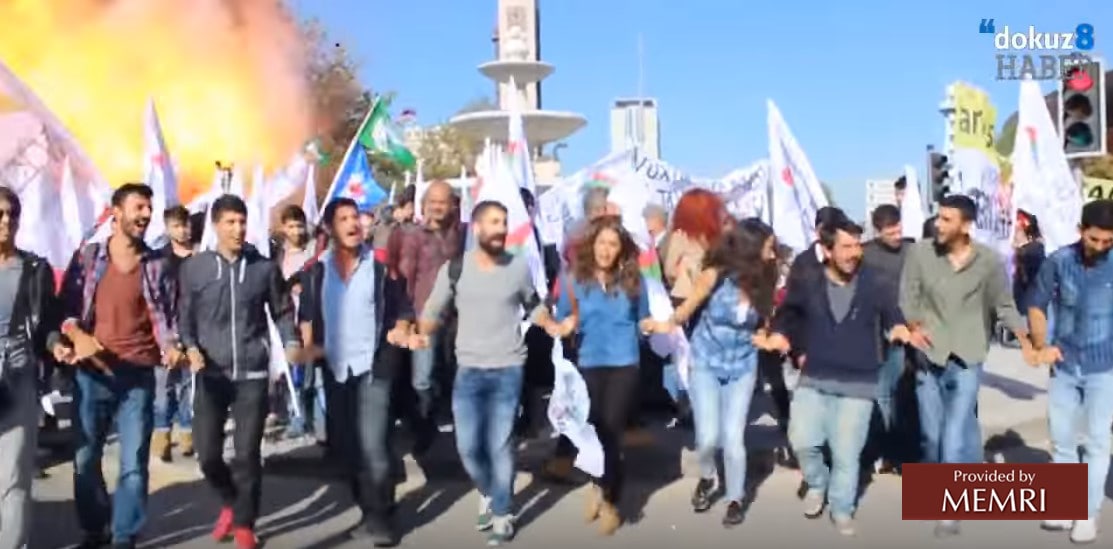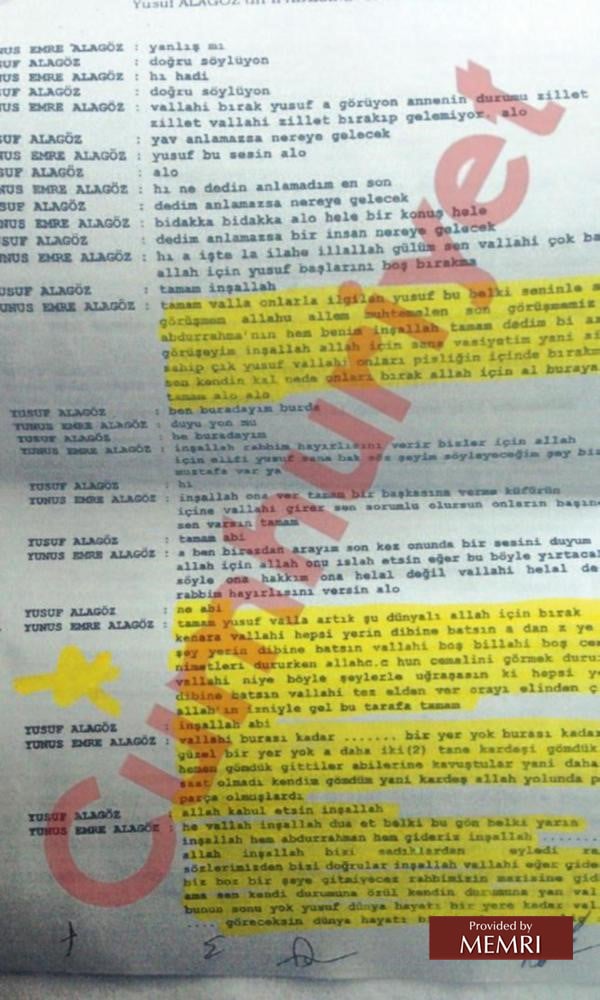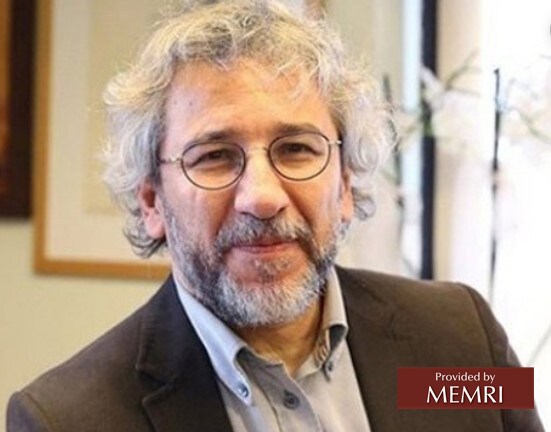In an August 23, 2019 speech in Sakarya, Turkey, former Turkish Prime Minister and Foreign Minister Ahmet Davutoğlu said: "If the counter-terror files [of Turkey] were to be opened, a lot of people could not face anyone. Those who criticize us today could not face anyone. I'm telling you. When, in the future, the history of the Republic of Turkey is written, I am sure that one of the most critical few-month periods will be that of June 7 to November 1, [2015]."[1] On September 13, Davutoğlu resigned, after notice was given that he would be expelled, from President Recep Tayyip Erdoğan's party, the ruling Adalet ve Kalkınma Partisi (AKP), of which Davutoğlu had at one point been the leader.[2] Deputy Prime Minister Numan Kurtulmuş said that it had been requested that Davutoğlu be expelled from the party specifically because Davutoğlu's statement in the August 23 speech had been perceived as a threat to the AKP.[3]
Davutoğlu was referring in his speech to two terrorist attacks in 2015 that impacted the re-election of Erdoğan's AKP and that authorities did not prevent, despite Turkish intelligence having had prior information and advance warning about the imminent occurrence of at least one of the attacks. Davutoğlu insinuates that the attack was permitted to happen in order to influence the results of an election in favor of Erdoğan.
The first attack occurred on July 20, 2015, in the Suruç district of Şanlıurfa, Turkey, and killed 34 people. The second attack occurred on October 10 in Ankara and killed 104 people. While in the June 7 election, which took place before these two attacks, the AKP lost its parliamentary majority and faced the prospect of having to form a coalition with other parties, in the November 1 election, which took place after these two attacks, the AKP regained its parliamentary majority, allowing it to remain in power without forming a coalition.
Government documents exposed after the attacks, the "counter-terror files" to which Davutoğlu referred, show that the government had been warned of the threat of an attack with the precise characteristics of the October 10 attack in Ankara and, to the benefit of the AKP and President Erdoğan, did not take any action to prevent it. The government further rejected the recommendations of inspectors to investigate the security chiefs in whose jurisdictions the attackers had operated and opened a criminal case against the journalists who published information about these events.
It should be noted that Ahmet Davutoğlu, who called this period "one of the most critical few-month periods" of Turkish history, is not a journalist or commentator, but a man who has served as Turkey's prime minister, as its foreign minister, as a member of parliament, and as leader of the AKP. Indeed, he was prime minister and party leader during the five-month period in question.
Following are the details of the two attacks and two elections.
June 2015 – AKP Loses Its Majority, Must Form Coalition; Attacks In Şanlıurfa, Ankara Follow
In the June 7, 2015 general election in Turkey, the AKP took only 40 percent of the vote,[4] losing, for the first time in its then 13-year rule, the parliamentary majority it needed to stay in power by itself, and so would have been forced to form a coalition government.[5] On July 20, at a rally of the Young Socialists Association Federation in the Suruç district of the Turkish city of Şanlıurfa, 20-year-old mechanical engineering student at Adıyaman University and Islamic State (ISIS) member Abdurrahman Alagöz[6] detonated his suicide vest, killing 34 people[7] and injuring 104.[8] On August 25, Turkey's Supreme Electoral Council announced that, because a coalition government was not formed within 45 days of the June 7 election, another election would be held on November 1, 2015.[9]

The July 20, 2015 attack in Şanlıurfa, Turkey, killed 34 people and injured 104 (source: Haber-sanliurfa.com).
On October 10, at a rally of opposition party Halklarin Demokratik Partisi (HDP) and other political groups held at the Ankara railway station, suicide bombers Ömer Deniz Dündar and Yunus Emre Alagöz detonated their explosive vests, killing 103 and injuring 391, of whom 48 were severely injured, in the deadliest terror attack in Turkey's modern history. Yunus Emre Alagöz was the older brother of Abdurrahman Alagöz, who attacked the rally in Şanlıurfa.[10] In the November 1 election, the AKP won enough votes to remain in power by itself without forming a coalition government.[11]

The October 10, 2015 attack in Ankara killed 104 people and injured hundreds more (source: Dokuz8haber.net).
Inspectors From Interior Ministry Find Government Was Warned Of Possible Attack And Did Not Take Precautions
Government documents published by Turkey's Cumhuriyet daily, the country's leading opposition daily, showed that Ömer Deniz Dündar had been arrested by Turkish police and, after being set free, went to Syria to receive training. Police had reportedly tapped a May 2015 phone call in which Yunus Emre Alagöz, speaking from Syria two months before the Şanlıurfa attack, said to his other younger brother Yusuf Alagöz: "This may be the last time I will talk to you... for Allah, my last will to you is to take care of the family, Yusuf... There is no place as beautiful as here, we buried two of our brothers... They were blown to pieces in the path of Allah."[12]

Turkish government transcript of phone conversation between Yunus Emre Alagöz and Yusuf Alagöz (source: Cumhuriyet.com.tr).
SUPPORT OUR WORK

In an official report after the Ankara attack, a director at the Ankara branch of Turkey's Directorate of Security, identified only by the initials A.A., accused the Milli İstihbarat Teşkilatı (MİT), which is Turkey's intelligence organization, the Turkish armed forces, and the intelligence and counterterrorism units of Turkey's Directorate of Security of not taking the necessary precautions before the attack. A.A. wrote in his statement: "The terrorists who carried out the explosion came on a route through Syria, Gaziantep, Osmaniye, Adana, and Aksaray to reach Ankara. When the terrorists were in the jurisdiction of the governor of Gaziantep, the MİT regional director for Gaziantep, the gendarmarie command for Gaziantep province, and the General Security Directorate for Gaziantep province, why were they not located and caught?"[13]
Inspectors from the Interior Ministry said in a preliminary report regarding the October 10 attack in Ankara that two days after the attack in Şanlıurfa, at a July 22 briefing at the Directorate of Security, the office of the governor of Ankara was warned that the Dokumacılar group, which had formed in 2013 in the outskirts of Adıyaman and in 2014 began recruiting for ISIS,[14] may attack Ankara. A wealth of intelligence had also been sent to the Ankara branch of the Directorate of Security after the July 20 attack in Şanlıurfa. These reports mentioned Yunus Emre Alagöz many times and said that the Dokumacılar group, of which Alagöz was a member, was targeting the HDP. A September 10 intelligence report said, as previous reports had done, that Ankara could be the target of an attack. While previous reports had warned that "places where people gathered in crowds" in general were potential targets for attacks, a September 14 report said that "a complex attack using multiple suicide bombers could take place at a rally/crowded place."
Intelligence had also found that a cellphone associated with Alagöz and Mehmet Işık had been used in Ankara two days before the attack. Many reports saying that the AKP and HDP were potential targets had been distributed to employees of the Directorate of Security, and that those employees viewed the HDP as the potential target of an attack by ISIS.
Ankara Governor's Office Refuses Investigation Recommended By Interior Ministry Inspectors
The inspectors from the Interior Ministry wrote in their report that ahead of the October 10 attack in Ankara there was this much intelligence concerning how Alagöz and Işık had entered Turkey and were communicating using telephone numbers in Ankara and how a rally at which the HDP was a participant could be the target of an attack and yet no observable precautions had been taken against such an attack. The inspectors therefore concluded that "there is public interest in opening a legal investigation" into: then provincial security director Kadri Kartal; former Ankara Intelligence branch Director Cihangir Ulusoy; Ankara Counterterror Police Branch Director Hakan Duman; former Ankara Security Branch Director Adem Arslanoğlu; and Ankara Counterterror Chief Emir Hüseyyin Özgür Gür. The office of the governor of Ankara refused any such investigation.[15]
Further, notice was given on April 15, 2017, that a criminal case had been opened against Evrensel.net editor-in-chief Fatih Polat, Cumhuriyet editor-in-chief Can Dündar, and reporters Tamer Arda Erşin, Cem Gürbetoğlu, and Kemal Göktaş, for publishing this information. Polat said of the case: "That's great, but there is no crime here. Just journalism." Can Dündar said: "Imagine witnessing a murder. You beguile the killer, the collaborator, and the lookout. You exclaim: 'This is the killer, that's the lookout.' And you are judged for giving away the killer and the lookout. This is the summary of the case opened against Cumhuriyet and Evrensel for its October 10 headlines." The case was later dropped.[16] Can Dündar, who had previously been imprisoned for his reporting related to Turkish intelligence shipments of weapons into Syria, now lives in Germany[17] and a "capture resolution" has been issued for him in Turkey.[18] Göktaş referred to the attacks as a "bloody election game."[19]


Former Cumhuriyet editor-in-chief Can Dündar (left) and Evrensel editor-in-chief Fatih Polat (sources: Aksam.com.tr, Gazetekarinca.com).
[1] Tele1.com.tr/davutogluacikla-7-haziran-1-kasim-arasinda-neler-yasandi-suruc-ankara-78588, August 24, 2019.
[2] Tr.euronews.com/2019/09/13/ahmet-davutoglu-ak-partiden-istifa-etti, September 13, 2019.
[3] Haberler.com/numan-kurtulmus-ahmet-davutoglu-nun-ihrac-12407790-haberi, September 9, 2019.
[4] Sabah.com.tr/secim/7-haziran-2015-genel-secimleri, accessed August 27, 2019.
[5] Cumhuriyet.com.tr/haber/secim_2015/294008/Yeni_hukumet_nasil_kurulacak__iste_Koalisyon_senaryolari.html, June 7, 2015.
[6] Haberturk.com/gundem/haber/1105897-supheli-adiyamanli-teror-sucundan-araniyor, July 22, 2015.
[7] Web.archive.org/web/20151203120147/http://www.aljazeera.com.tr/haber/suructa-34-olum, August 14, 2015.
[8] Bbc.com/turkce/haberler/2015/07/150720_suruc_saldiri, August 27, 2019.
[9] Hurriyet.com.tr/gundem/ysk-baskani-erken-secim-tarihini-acikladi-1-kasim-2015-29901387, August 25, 2015.
[10] Cnnturk.com/turkiye/10-ekimde-oldurulenler-katliamin-3-yilinda-ankara-gari-onunde-anildi, November 12, 2018.
[11] Secim.haberler.com/2015, November 1, 2015.
[12] Cumhuriyet.com.tr/haber/turkiye/389483/Polis_bombacilari_biliyordu.html, October 17, 2015.
[13] Evrensel.net/haber/277374/guvenlik-sube-amirinden-10-ekim-itirafi-mit-tsk-ve-egm-onlem-almadi, April 12, 2016.
[14] Internethaber.com/dokumacilar-grubu-nedir-liderleri-kimdir-1478571h.htm, October 14, 2015.
[15] Evrensel.net/haber/277521/ankara-katliaminin-bir-tek-saati-bilinmiyormus, April 14, 2016.
[16] Cumhuriyet.com.tr/haber/turkiye/905343/10_Ekim_katliami_haberlerine_iliskin_acilan_dava_dusuruldu.html, January 15, 2018.
[17] Bolgegundem.com/can-dundar-kimdir-can-dundar-nerede-yasiyor-564820h.htm, September 29, 2018.
[18] Sabah.com.tr/gundem/2018/12/06/son-dakika-can-dundar-hakkinda-yakalama-karari, December 5, 2018.
[19] Tr.boell.org/tr/2015/11/05/kanli-bir-secim-oyunu, November 5, 2015.




